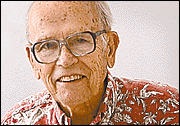


Hawaii’s World
TO jump over the filter of the Washington press corps, his scourge, President Nixon periodically held regional briefings for editors around the country. The backlash against
U.S. superpowerA typical day consisted of greetings and a summing up by the president interspersed with informative talks by his cabinet or other advisers. It was clubby because the invited list was only about 25 or 30.
I attended one such gathering at Portland, Ore., and another at San Clemente, Calif., his private residence, to which we were ferried by helicopter from Los Angeles airport.
This was heady stuff. We assured ourselves it would not affect our news judgments, other than to leave us better informed.
At San Clemente, the president introduced us to Secretary of State Henry Kissinger. Nixon forecast accurately that Kissinger would impress us with his briefing and top that by his handling of questions.
My notes are long gone but I remember Kissinger addressing the role of U.S. power in the world. No nation, he said then, in the early 1970s, could stand up to the power of the Soviet Union without our help -- thus the need for the North Atlantic treaty alliance.
It was an object of U.S. policy, he said, to build a world in which we could share the defense load more equally. However, we could not yet unload our burden without great danger to world stability.
I recall this in 1999 because the bulk of the load still is ours, even with the Soviet Union dissolved. We still don't seem able to push it onto other shoulders.
The Wall Street Journal recently reported a new twist to this problem. Our awesome show of power in battering Yugoslavia with no American deaths is disturbing, it said, to our friends as well as our rivals.
What kind of monster might we become? Should they, too, be on guard against us? Could our awesome wealth, technology and power be provoking world rearmament?
Did the Russian rush to beat us into Kosovo hint that its generals and politicians are no longer in tandem? Russia remains a major nuclear nation. More the worry.
China's President Jiang Zemin is supposed to have sputtered that China, supposedly a great power, was irrelevant to Kosovo.
Both China and Russia are furious that we circumvented their United Nations Security Council vetoes by working through NATO instead of the U.N. -- and just after NATO's enlargement. Even our NATO partners worry privately that the bulk of the real power was ours, the Journal said.
ARE we willing to calm them by sharing our technical wizardry? Should we? Can they afford it?
If we don't share, will we trigger more apprehension and armament?
To me there is no question the world needs a police force. Human nature demands it. We are at our best when we know others are watching and on guard. An ideal might be a United Nations police force, possibly carried so far as to put a United Nations Navy in Pearl Harbor.
That won't be tomorrow, likely not for decades, if ever. What the Kosovo bypass of the U.N. has made urgent, however, is something suggested to the Pacific Forum/CSIS here last January.
President Bush's national security adviser, Brent Scowcroft, said it is time for serious international talks about how to shape a new, more suitable world order. He may not have said it, but Kosovo showed it: Today's U.N. structure is out of date.
A.A. Smyser is the contributing editor
and former editor of the the Star-Bulletin
His column runs Tuesday and Thursday.